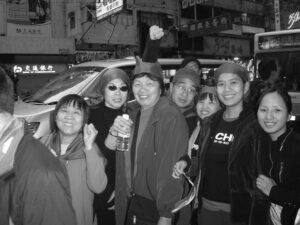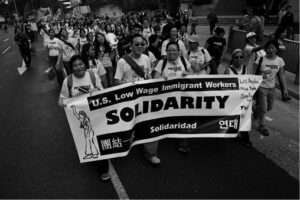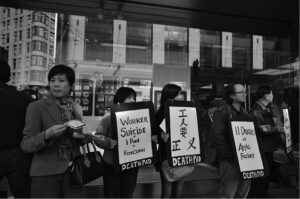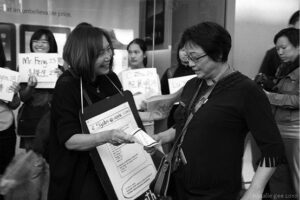 Andrew Sebald: Thank you all for being here. Can you describe your experiences with labor organizing in China?
Andrew Sebald: Thank you all for being here. Can you describe your experiences with labor organizing in China?
Ellen David Friedman: I am a retired union organizer. I’ve spent about fifty years working in the U.S. labor movement, but I spent ten years living and working in China. I was drawn by a compelling need to try and understand what was happening in China after Deng Xiaoping’s “opening up” began in the 1990s. I spent ten years living and getting involved with the labor movement at many levels. In the United States, I volunteer primarily through the portal of Labor Notes, where I’m honored to serve as chair of the board.
I traveled to China around twenty-five years ago. I was motivated to go to China because I was an ardent follower of the Chinese Revolution. I had been impressed and intrigued by some of the earliest accomplishments of the revolution, but then watched as history unfolded. I saw terrifying turns in the direction of authoritarianism in China, suppression of the working class, and so on. At that point, I had a background of almost forty years organizing in the U.S. labor movement in various sectors, from manufacturing to public education. I was despondent about what neoliberalism had brought about in this country: the hollowing out of our unions that abandoned the idea of worker power, and unions turning in the direction of relying on the state to solve the contradictions of capitalism. I did not consider that a productive direction of progress, so I wanted to see something different.
My experience in China coincided with a period of liberalization under the leadership of Hu Jintao and Wen Jiabao, when activists from abroad were tolerated to a remarkable degree. I could live and teach at a university in Guangzhou named Sun Yat-Sen University, where I established an International Labor Research Center. It was sponsored for four or five years, supporting exchanges of labor activists. People were flocking to China, particularly to the Pearl River Delta, which had become “the world’s factory.” There were thousands of strikes going on all the time in thousands of factories. It was very compelling, and we were able to turn these moments into researchable topics. There was a brief period when we could both engage in research and exchange with workers directly at the worksite level, from meeting people in their dormitories at their factories in public places to conducting educational and organizer training. People were coming from all over the world to research this. It was very fruitful and thrilling.
Then, Xi Jinping came to power, and the walls closed in on us. By 2013 or 2014, our center was closed. We were no longer able to invite foreigners to come. I was picked up by the national security police and told to leave the country. Since 2015, I have been trying to develop avenues for creating U.S.-China labor solidarity under unbelievably restrictive conditions.
Kevin Lin: I became interested in labor issues in China between 2009 and 2010. Those years were significant moments in recent Chinese labor history in terms of the scale of workers’ struggles. I was fortunate to be attracted to the labor movement in China when there were militant workers’ struggles.
I finished my undergraduate degree around 2009 and 2010. I read about the latest labor developments in China on a daily basis, from strikes to labor reforms to tragedies. At that time there was rapid development in labor relations and escalations in worker struggles. I was part of a generation of young people who were attracted to the labor movement in China because of those struggles. A transition in consciousness was taking place, where people in China no longer saw rural migrant workers as mere victims of an oppressive system. This period, between the late 2000s and early 2010s, was when people really changed their attitude from sympathy to solidarity. People in China did not just pity migrant workers, but actually wanted to join them in struggle. That’s the kind of solidarity that emerged in this period. It’s the kind of solidarity I believe in now, beyond holding moralistic sympathies for people in poor working conditions.
Alex: I would describe myself as a movement activist and organizer for the past 25+ years. I was with the Chinese Progressive Association (CPA) in San Francisco for over 15 years. The CPA, which started in the early ‘70s, established numerous branches and chapters nationwide. The CPA was a key force in the Chinese immigrant community in advocating for the normalization of U.S.-China relations, and was a strong supporter of the Chinese revolution. That was a very taboo thing to do in Chinatown, which back then was controlled mainly by the Kuomintang (KMT).
Our community has a history of people-to-people diplomacy that is part of our legacy. It’s also important to remember that Chinese workers were also living and working in the United States, and many of the founders of the CPA were undocumented workers. This is important because we’re now seeing the potential of diasporic organizing here in the United States.
Many splits have also materialized in the organization in the past fifty years. One of the biggest splits was about the Tiananmen Square Massacre. Our organization and other CPA branches took a position to support students and workers. Not everyone on the left supported this, but there were definitely people on the left and in mass organizations that did. That split is really important because some believe people-to-people diplomacy is unconditionally supporting the positions of revolutionary governments. But we need to continue to stay grounded and build with whoever represents the conscience of the working people, whether or not they are in power.
When I started at CPA in 2004, I connected with Ellen and then later with Kevin. China was entering the World Trade Organization (WTO), which marked an important milestone for globalization. In 2005, we felt compelled to bring Chinese workers, students, and young people from the United States to protest the annual WTO meeting being held that year in Hong Kong. While many people viewed the 2000 Seattle protests as the big breakthrough for the anti-globalization movement, for many Asians it was the 2005 protests in Hong Kong. This was the first time Chinese immigrant communities openly criticized and mobilized against globalization. Some perceived this as “China-bashing” within our own community and membership. Of course, this changed after we conducted more community education about the working conditions in China and other parts of Asia.
CPA has been around for many decades and has navigated various political conditions and ideological struggles within our ranks. In the end, this is how we maintained our mission and values—striving to represent the conscience of the people. Together, they joined the WT-NO delegation, which included over 40 leaders from Los Angeles, Philadelphia, New York, and other U.S. cities (see Figures 1 and 2).
In the Summer of 2010, CPA organized a memorial vigil in front of the Apple store in San Francisco for Foxconn workers who had committed suicide (Figure 3). Foxconn is the largest electronics manufacturer in the world, and a prime source of Apple products. The conditions in the factory are so difficult for young workers that dozens have attempted suicide, but multiple efforts to raise wages have still not improved conditions.

Andrew: What are the similarities between the conditions faced by U.S. and Chinese workers?
Ellen: After settling in China and grappling with its complex societal layers, I became aware that the All-China Federation of Trade Unions (ACFTU) is essentially a government entity rather than a mass organization representing the interests of the working class. Under the pressures of neoliberalism, the ACFTU, despite being enormous and possessing numerous resources, has become a hollow, top-down organization that was totally removed from the needs of its rank-and-file members. For those of us who believe unions should be homes for workers to learn how to fight for the working class, we accept that labor-management relationships are antagonistic. But this idea is completely absent in the ACFTU. When I returned to the United States, I saw similar problems in many of our unions here too. Certainly, not all U.S. unions are hollow, and the recent labor upsurge clearly reveals an undercurrent of democratic reform. However, in the United States and China, union leadership tends to be very top-down, conservative, bureaucratic, and focused on building relationships with politicians rather than their workers. In China, any attempt by rank-and-file workers to independently organize within unions is heavily repressed, and democratically-led unions seem very far away.
Kevin: In the last twenty or thirty years, China’s economy has been driven by export-driven industrialization. Factories sprung up everywhere in China; rural migrant workers moved to cities, and low-wage, low-skilled industrialization drove China’s economy. The core of China’s worker struggle was the industrial working class. This was not the case for the United States at that time. At that point, the country had already deindustrialized over the previous twenty or thirty years. I recall sitting in meetings with delegations of Chinese workers and activists with U.S. unionists, and the U.S. workers, while expressing interest and solidarity, had trouble relating to the struggles of the Chinese working class because the Americans were mainly in the service sectors. Now, I think there is increasingly less misalignment between the U.S. and Chinese working classes. China is experiencing the beginning of its own post-industrialization, and more young Chinese people are white-collar workers and beginning to work in the tech and service sectors. More Chinese workers are feeling bleak about their futures, similar to what American workers started feeling many years ago.
I believe workers can best build solidarity through shared experiences of concrete conditions. Building solidarity on the basis of moralistic abstractions is not sustainable and does not effectively drive organizing. Now that the U.S. and Chinese working classes are starting to experience similar struggles, an arena is emerging where they can organize together.
Alex: I want to build off that with a story of my own. In our WT-NO delegation, we had workers from Chinatown, one of whom had been a garment worker during the Cultural Revolution. Before our trip, our delegation members held a sense of pride in China. We had expressed a critique of globalization, and they often said we should be more “dialectical” about it. Globalization might have bad consequences, but it was hard not to be patriotic about China’s meteoric rise to the international stage. When they visited China, they only witnessed the rapid development and modernization of their hometowns. Many of the delegation members believed we were lying about the conditions of workers, stating that we had been listening to too much anti-China rhetoric. However, shortly afterwards we traveled to the special economic zone (SEZ) in Shenzhen and they were shocked by how bad the working conditions were. The worker who had worked at a cotton factory during the Cultural Revolution remembered that her minimum wage was a lot higher than at the factories in the SEZ. She was shocked that the wages were so low.

Andrew: Are there other important moments of U.S.-China labor solidarity in the past few decades? How can they inform us about such solidarity in the future?
Ellen: In the 20 years that I have conducted this work, the high point of U.S.-China worker solidarity for me was the Hong Kong Dockworkers’ Strike of 2013. A small group of crane operators initiated the strike. While few in number, they were highly skilled, so when they stopped working, everything else stopped too. The strike expanded quickly. In Hong Kong, trade unions were in contention at that time. One was the Hong Kong Federation of Trade Union (HKFTU), which was closely associated with the ACFTU of the mainland and was typically more docile. The other was the pro-democracy Hong Kong Confederation of Trade Unions (HKCTU), which had to dissolve after the implementation of the National Security Law in 2020. Both of these labor federations were present, but the militancy of the dockworkers associated with the HKCTU was so powerful and charismatic that it quickly drew widespread movement support. Students, socialists, and other trade unionists rallied to support the dockworkers. The mobilization of public sentiment of this magnitude was astonishing.
I was in Guangzhou then, so I could go back and forth between Guangzhou and Hong Kong to witness the strike. When I returned to the United States, we organized a speaking tour for the leaders of the Dockworkers Union. They first came and spoke at the Labor Notes conference in 2014; then they participated in a whirlwind tour to garner support from the West Coast dockworkers’ unions. It was rather frenetic, but we hit every dock on the West Coast represented by the International Longshore and Warehouse Union (ILWU). The ILWU has a longstanding history of internationalist unionism, one of the few U.S. unions with that legacy. The ILWU hosted these leaders for talks in Los Angeles, Oakland, Tacoma, Portland, and several other docks. They raised a lot of money to support strike expenses. We also met with several affinity groups and community groups, like the CPA. One could feel that workers’ comparable positions, even though their unions were different, enabled them to recognize similar conditions and their power over the global movement of capital. It was very powerful.
I have to say that anything like that is beyond our imagination right now. We must be extremely sober in our assessment and expectations of possibilities of worker-to-worker contact. Right now, anyone who came from China and held a very public position around labor militancy would be in very grave danger when they returned home. Needless to say, they want to avoid exposing themselves to that, so horizons like that are not in front of us at the moment.
Alex: Building on what Ellen said, hosting worker-to-worker conversations qualitatively shifted our base in the United States because many workers had been afraid to take a stand. However, after seeing Hong Kong dockworkers or young women workers organize, I heard some of those same people in the United States say, “Wow, if they can do it, we can do it”. There is a very important connection when people see struggle and protest in China.
I want to also stress that organizing is still happening in China. However, as Ellen said, having a sober assessment of what is possible in China is important. It could be decades before conditions shift. The way to move forward is to assess the moment and ponder the role of diasporic organizing. There are hundreds of thousands of Chinese internationals in our midst. Some of them have also been part of movements in China, and one of the interventions I have been pushing for within the Asian American community is to embrace those international students as part of our movements and communities. They need space to build and strategize around political issues: labor, questions of sovereignty and democracy at home, climate, feminism, and so on. But we must create a strategic space for them to struggle, build, and connect with other movements.
Kevin: I want to conclude with something a little more abstract. I have been reading two recently published books about this question of solidarity. One is Struggle and Mutual Aid in the Age of Working Solidarity (Other Press, 2023) by Nicholas Delalande, which is a history of the First International. The book goes through the historical experience of forging links between the European and American working classes to transcend national borders and build deep relationships with each other. The other book is Solidarity: The Past, Present, and Future of a World-Changing Idea by Leah Hunt-Hendrix and Astra Taylor (Penguin Random House, 2024). This book tells us that the idea of solidarity itself is relatively young, as it mostly emerged out of the Industrial Revolution. Of course, communities have been mutually supporting each other for most of history, but the term and modern practice of solidarity is quite a recent phenomenon. It came out of this sense that people are indebted to one another, not just through moralistic or political means, but also economic ones, thanks to the development of capitalism. The idea is that we should be in debt to each other materially to support one another.
This material aspect is important because the First International established that solidarity is about workers wresting control of the economy from the capitalists and the capitalist state. The book made me think even more about what it means to practice solidarity, and how or where it failed. Solidarity is not only found in visible demonstrations of support; it is also built through everyday deeds of translation, deep understanding of each others’ struggles, and long-term relationship building. These are the solid foundations upon which we can build our solidarity.

Ellen: You have laid the table nicely for a point I would like to add, Kevin. When facing conditions in which many people live in exile or are living under incredibly restrictive constraints at home, we often think of this isolation as a huge impediment to a material form of solidarity. The most critical form of solidarity is when people continue to develop a set of values and analytic tools to assess reality and commit themselves to a certain intention over time, regardless of the conditions surrounding them at a particular moment. I have seen some beautiful examples of this. At the most recent Labor Notes conference, we had people worldwide who have developed democratic unionism in practice—even in conditions of growing authoritarianism. We are seeing a tremendous thirst for radically democratic practice, not just voting, but learning how to conduct themselves with each other in radically respectful ways. This movement of solidarity of beliefs and goals, building across great distances, is going to be an enduring and sustainable form of power as we move forward.
This Article is part of a special section on labor in China:
|


Leave a Reply